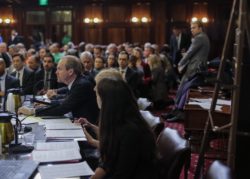
New York City Council Member Jumaane Williams. Image credit: NYCC/William Alatriste
Housing Committee hears testimony on 21 pieces of legislation to address 30 deaths at construction sites in past two years, including requiring apprenticeship training citywide. On January 31, 2017, the City Council’s Committee on Housing and Buildings heard testimony on a large package of bills concerning construction safety in New York City. Chair Jumaane Williams began the eight-hour long hearing by reading the names of the 30 workers that lost their lives in construction accidents in the past two years. Twenty-one pieces of legislation were on the Committee’s calendar to consider.
Seven bills focus on crane safety at work sites, and are largely based upon recommendations of the Crane Technical Working Group. The bill package would impose an age limitation on crane users, require cranes to be equipped with devices to measure wind speeds, provide GPS and allow data logging, require precautionary actions on windy days, require registered lift directors be present, and require a special license endorsement for operators of complex cranes.
Other bills would place requirements on the Department of Buildings. Specifically, the DOB would be required to report violations to OSHA, to report on all construction accidents that result in an injury or death, and to report to the City Council and the public the number of site safety managers and coordinators operating in the City.
Three bills would increase civil penalties and fines for safety violations. The minimum and maximum civil penalties would be increased. The package would allow for larger civil penalties where safety violations are accompanied by or result in a death or serious injury—allowing for a penalty between $500,000 and $1.5 million. Civil penalties would be further doubled for violations at sites that already have an excessive number of violations.
Other bills would require all workers to receive task-specific instructions for supervised or hazardous activity, and all workers would receive site-specific orientations. Construction workers on City-financed developments would need to be paid a prevailing wage. A tiered system would be created to enforce the City’s safety registration numbers for contractors. Sites would require safety netting systems and guardrails to protect floor openings. Buildings more than four stories in height would require safety plans be filed with the DOB.
The piece of legislation that drew the most debate was a proposal to require apprenticeship training. Construction workers would be required to be participants in an apprenticeship program, a graduate of an apprenticeship program, or have commensurate work experience or training in order to work at private construction sites for buildings ten stories or higher. The legislation has drawn support from construction unions, which already require apprenticeship training. At a rally at City Hall 30,000 workers from the trade unions gathered to support the proposal. Gary La Barbera, president of the Building and Construction Trades Council, stated that “We can no longer tolerate irresponsible developers and contractors who are putting profits over the safety of workers.”
Other trade associations do oppose the apprenticeship legislation. The New York State Association for Affordable Housing and the Real Estate Board of New York City both oppose the requirement as not addressing the safety concerns that generated the legislation.

Department of Buildings Commissioner Chandler. Image credit: NYCC/William Alatriste
At the January 31st hearing, DOB Commissioner Rick Chandler, testified in support for many of the proposed safety bills. Chandler expressed concerns, however, about the proposed requirement for an apprenticeship program for all workers citywide. He noted that such programs can create barriers for workers who do not have a G.E.D. or are not proficient in English. Chandler argued that requiring participation in an apprenticeship program would prevent “local talent” from participating—particularly the two million New Yorkers who are not proficient in English, lack a G.E.D. or both. Chandler was also doubtful that a prevailing wage would address any safety concerns expressed at the hearing.
In response to Chair Williams’ question of what training would appropriately address safety, Chandler stated that an expansion of the OSHA 10 program for all work sites would be more targeted to construction safety. OSHA’s ten hour training program is a 100 percent online safety program which is currently required by DOB to be repeated every five years for workers performing construction on buildings in excess of ten floors.
Council Member Elizabeth Crowley was combative when questioning Chandler. Citing the Committee’s report, Crowley noted that while permits issued by the DOB were up 15 percent from 2014 to 2016, fatalities had gone up 100 percent in that same time. She laid blame for the rise in deaths on a “lapse in safety standards and supervision on the behalf of the DOB.” Crowley, sponsor of the prevailing wage bill, was baffled that the DOB would oppose requiring prevailing wages and apprenticeship training, which she pointed out that the School Construction Authority already requires for all its developments.
Council Member Benjamin Kallos expressed concerns over DOB’s testimony against apprenticeship programs. Kallos noted, and DOB conceded, that there are apprenticeship programs offered in a range of languages other than English, so language may not be such a bar. Further, when asked how many programs require a G.E.D. or its equivalent, the DOB was unable to provide an answer because it did not track such things. Kallos asked DOB to reconsider its position based on the lack of data to back the DOB’s assertions.
By: Jonathon Sizemore (Jonathon is the CityLaw Fellow and a New York Law School Graduate, Class of 2016).


Very nice article informative content thanks we liked it.